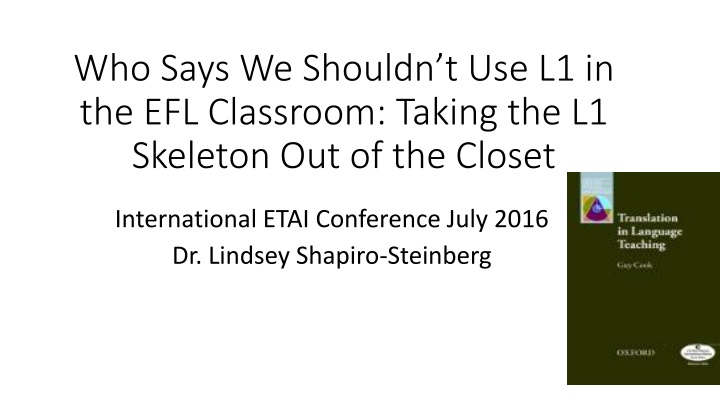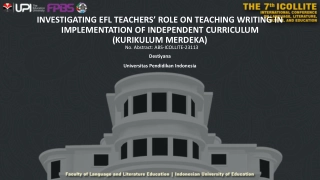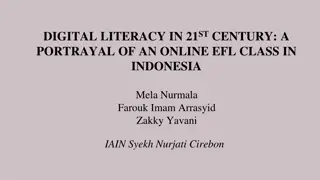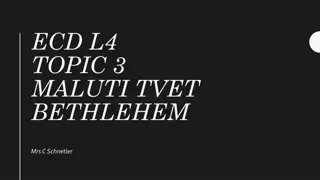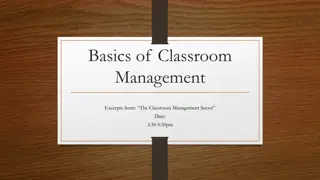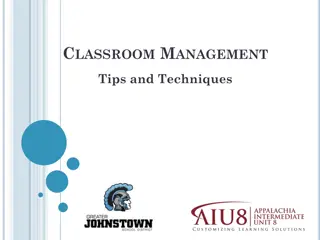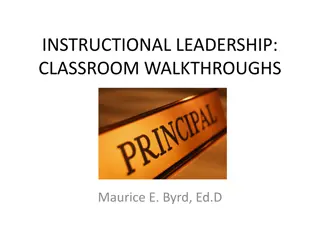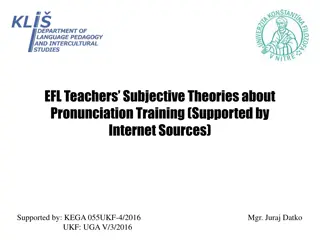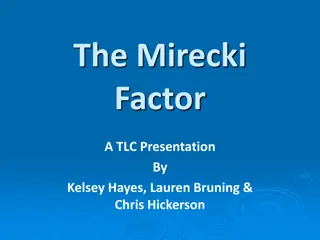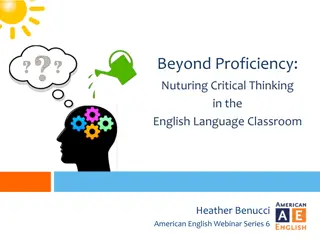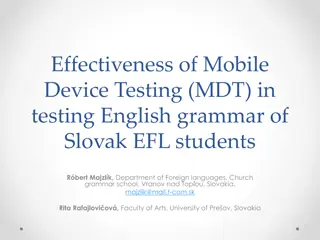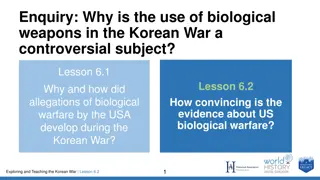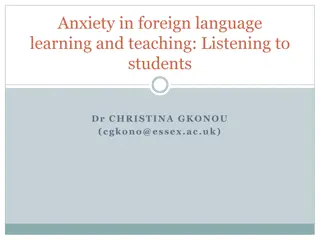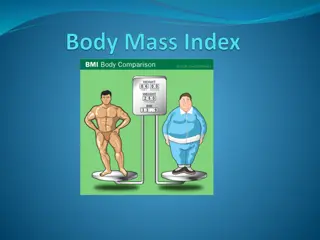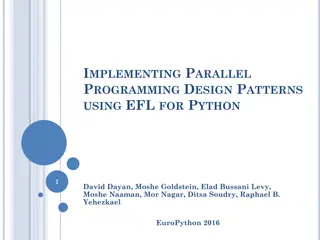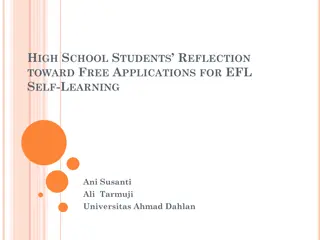The Controversy Surrounding L1 Use in EFL Classroom
This content explores the debate around the use of the first language (L1) in the English as a Foreign Language (EFL) classroom. It discusses a presentation by Dr. Lindsey Shapiro-Steinberg on the topic at the International ETAI Conference in July 2016. Additionally, a story about Tommy's day at home is interwoven, illustrating the importance of language learning and communication. The final section outlines a language learning task involving the translation of sentences between English and Hebrew within a group setting.
Download Presentation

Please find below an Image/Link to download the presentation.
The content on the website is provided AS IS for your information and personal use only. It may not be sold, licensed, or shared on other websites without obtaining consent from the author.If you encounter any issues during the download, it is possible that the publisher has removed the file from their server.
You are allowed to download the files provided on this website for personal or commercial use, subject to the condition that they are used lawfully. All files are the property of their respective owners.
The content on the website is provided AS IS for your information and personal use only. It may not be sold, licensed, or shared on other websites without obtaining consent from the author.
E N D
Presentation Transcript
Who Says We Shouldnt Use L1 in the EFL Classroom: Taking the L1 Skeleton Out of the Closet International ETAI Conference July 2016 Dr. Lindsey Shapiro-Steinberg
Yesterday was Monday. Tommy was at home /all by himself. He felt ill. His parents were at work. His father went to work as usual but his mother came home early. She wanted to be with Tommy. She baked Tommy a cake and played games with him. Tommy ate the cake and it was so tasty that he gave his mother a kiss to show her how much he appreciated it. They spent the whole afternoon together. At about 7 o'clock Tommy's father came home and brought him a surprise. It was his favorite chocolate cake. Tommy was so excited that he hugged his father and said "Thank you!" But after all the cakes Tommy ate, he started to feel sick again. Another day off school?
Yesterday was Monday. Tommy was at home all b______ himself. He felt ill. His parents were at h____. His father went to work as usual but h___ mother came home early. She wanted to be w____ Tommy. She baked Tommy a cake and played g_____ with him. Tommy ate the cake and i__ was so tasty that he gave his mother a_ kiss to show her how much he appreciated i__. They spent the whole afternoon together. At a_______ 7 o clock Tommy's father came home and brought him a_ surprise. It was his favorite chocolate cake. T_____ was so excited that he hugged his father a___ said "Thank you!" But after all the c_________ Tommy ate, he started to feel sick a_____. Another day off school?
Yesterday was Monday. Tommy was at home a_____ b______ h_______. He felt ill. His parents w______ a___ h____. His father went to work as usual but h___ m_______ came home early. She wanted to b________ w____ Tommy. She baked Tommy a cake and p________ g_____ w________ h_______. Tommy ate the cake and i__ w_______ s______ t______that he gave his mother a____ k_________ to show her how much h_____ a_______ i__. They spent the whole afternoon together. At a_______ 7 o_________Tommy's father came home and brought him a_ surprise. It was his favorite chocolate cake. T_____ was so excited that he hugged h_______ f______ a___ said "Thank you!" But after a______t____ c_______ Tommy ate, he started to f________ s______a_____. Another d____ o______ s_____?
TASK 1. 2. 3. 4. 5. Get into groups of between 3 and five. Each group member gets a sentence. Do NOT show it to the others. Translate your sentence into Hebrew . Fold the page over the English sentence and leave lonely your translation visible. Pass it to the person sitting to your left. Each group member receives a Hebrew sentence. Translate your sentence into English and once again fold the page over the Hebrew sentence you translated. 9. Pass it to the person sitting to your left . 10. Continue doing this until I ask you to stop!! 6. 7. 8. 9.
TraditionallyL1 has been taboo! 1. The spirit of the foreign language 2. No exact equivalents 3. Reliance on L1 4. Inhibits thinking in L2
However Reliance: The brain processes knowledge of two or more languages in parallel Thinking in the L2 unrealistic Spirit: Lingua franca Equivalent translations: collocations and chunking
What does the research say? Code-switching from English into the learner s own language creates a safe place enhancing participation and engagement (J. Arthur, 1996) Giving instructions , teaching grammar and managing the class in the learners L1, creates a climate of empathy (Polio and Duff, 1994) Benefits in the affective domain
Learning is likely to be more efficient if learners notice the similarities and differences between languages (Cummins, 2007). When contrastive analysis and translation is used to teach vocabulary, learners retain it longer (Laufer and Girsai, 2008). When translation tasks generate brain stretching and processing , the more long-term memory is activated (Cook, 2010; Laufer, 2008) Benefits in the cognitive domain
The role of L1 All learning should be based on a frame of reference (Vygotsky 1934, Sousa, 2014) Support and validate cultural identity Real and meaningful expression Online translation tools Practical
Principled use if L1 (Edstrom, 2006; kerr, 2014)
Reversed Translation 1. 2. Write 4-5 sentences about a particular topic. 3. Pass it to your friend who will translate it into Hebrew. 4. Fold over the English texts and pass it to the third group member. 5. She will translate the Hebrew into English. 6. Compare the second English text with the original Write your name at the top of the page
Gapped Reverse Translation with L1 Text ________________Monday. ________________home __________________. _______________ill. His parents ___________________. ____________________usual ___________________. _____________________. ___________________Tommy ___________________. Tommy ate the cake and it was so tasty that he gave his mother a kiss to show her how much he appreciated it. They spent the whole afternoon together. At about 7 o'clock Tommy's father came home and brought him a surprise. It was his favorite chocolate cake. Tommy was so excited that he hugged his father and said "Thank you!" But after all the cakes that Tommy ate, he started to feel sick again. Another day off school?
Dictagloss 1. T reads text 2. S make notes in L1 3. Write out as much as they can remember in L2
Vocabulary Prep for a text S get the title of a text List of L1 sentences Choose which ones they think will be in text Translate those sentences into English Read text and check
Uses of the word SEE SEE Do you see what I mean? See you later She s not seeing anyone at the moment I don t know what she sees in him Yes, Sir, I ll see to it as soon as possible. I don t see why they should win.
What do the verbs in each column have in common? make arrangements comment effort mess progress friends mistake Improvement excuse do favor homework damage talk test your best shopping dishes research
Can you do me a favor? No, I m busy doing the dishes. You always make excuses. Ok. What is it? Will you help me make arrangements for my birthday? Well, in that case, I ve done you a huge favor already! Surprise!
Finally: Contrastive Analysis We have the greatest amount of difficulty learning a foreign language when the structures are different. (Lada, 1957) Translation is an important fifth skill. (J. Malmkjaer, 1988) Translation in language teaching provides learners with a greater understanding of how the language works (G. Cook, 2011) Translation should be a major aim and means of language learning (Ibid)
For the teacher. It keep us interested in the language. It enhances my understanding of how the language works. I want to be engaged again and again by the wonder and mysteries of the English language. And then to feel energized by that wonder and love for the language in my students.
Thanks to Philip Kerr And thank you for coming!!!
